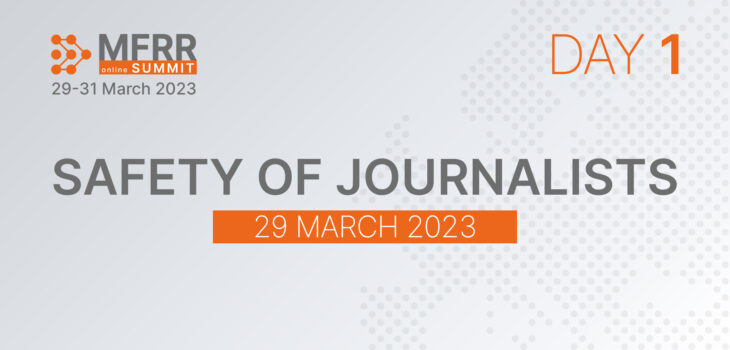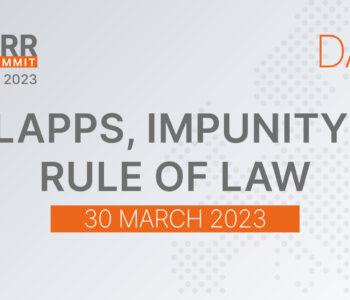
MFRR Summit 2023 | Day 1
Safety of journalists
29.03.2023
Journalist safety in Europe was thrown into the spotlight in 2022 following Russia’s invasion of Ukraine, with at least 10 journalists killed since 24 February. Outside of Ukraine, Europe remains an increasingly hostile environment for journalists to report from. From online attacks to physical violence, Day 1 of the Summit will highlight threats to journalists in EU Member States and candidate countries, sparking conversations on initiatives to support journalists in exile, reporting from a conflict zone, surveillance and spyware, and harassment in the newsroom.
Opening message
12:30 – 12:50 CET
The MFRR Summit 2023 will open with a speech from Věra Jourová, Vice President of the European Commission for Values and Transparency
Speaker:
- Věra Jourová, Vice President of the European Commission for Values and Transparency
Keynote: Reporting the war in a democracy
Freedom, security, and responsibility
12:50 – 13:30 CET
The state of the Ukrainian media landscape, the conditions for reporters covering the war, and the safety and protection of journalists in the country will all take centre stage during the first keynote of the MFRR Summit 2023. Ukrainian journalist Nataliya Gumenyuk will discuss the challenges and resilience of Ukrainian media as it faces its greatest threat in modern history. She will draw parallels between covering the war and covering natural disasters, rather than focusing on war correspondence in a political context. During her speech, Gumenyuk will draw links to security, responsibility, and free expression in times of conflict; as well as the dehumanisation caused by propaganda and how this enables war crimes.
Speaker:
- Natalia Gumenyuk, Director, Founder, The Public Interest Journalism Lab
One year of Russian aggression
How to support Ukrainian journalists’ work
13:45 – 14:30 CET
24 February 2023 marked one year since Russia’s full-scale invasion of Ukraine. Some Ukrainian journalists had previous experience with Russian aggression through the occupation of Donbas and Crimea. However, the escalation in this war of aggression – with the declared goal to extinguish the Ukrainian nation – created new existential threats for Ukrainian media. Many media organisations and journalists had to flee as their homes came under attack or occupation. But while the media market collapsed, many Ukrainian journalists and newsrooms continued to work under extremely difficult circumstances. They became the eyes and ears of both Ukrainian citizens and also people around the world. In the meantime, international correspondents arrived in Ukraine to cover the conflict. In this session the panellists will speak about their work in the war, their achievements, their needs, and the support they have received so far.
Speakers:
- Vassili Golod, Correspondent, ARD in Kyiv
- Oksana Romaniuk, Institute of Mass Information
- Kateryna Sergatskova, Editor in Chief, Zaborona Media, co-founder, 2402 Fund
Moderator:
- Rebecca Harms, Executive Board Member, European Centre for Press and Media Freedom, Former MEP
A view from the outside
Reporting in exile
14:45-15:30 CET
Due to threats to security and wellbeing, journalists, media workers, and even entire newsrooms can be forced to leave their home countries and find ways to continue their profession in exile. Relocation programmes offer temporary shelter for journalists that face harassment, intimidation, and threats as a result of their work. In this session, a journalist who had to leave their country will talk about their experience of being enrolled in the ECPMF Journalists-in-Residence programme; a representative of an exiled newsroom will discuss covering news from abroad; and a manager of the JiR programme will talk about the practicalities of and problems in offering safe shelter to journalists and media workers.
Speaker:
- Tatsiana Ashurkevich, Political Journalist and Observer, Former Journalist-in-Residence, European Centre for Press and Media Freedom
- Matthew Kasper, Publisher, Meydan TV Co-Director, Vereinigung für die Demokratie e. V.
- Alina Toropova, Journalists-in-Residence Programme Manager, European Centre for Press and Media Freedom
Moderator:
- Xhemajl Rexha, Chairperson, Association of Journalists of Kosovo
Surveying the landscape
Initiatives to counter spyware
15:45 – 16:05 CET
This discussion will explore the strengths and weaknesses of the current draft of Article 4 of the EMFA, through a comparative analysis of the existing independent authorities that the article requires member states to designate, in order to deal with complaints about breaches of provisions of the article itself. The lack of judicial ex-ante evaluation mechanisms will also be discussed as a key missing element which has attracted much criticism from media-focused NGOs and civil society organisations which have been called upon to provide feedback by the Commission.
Speakers:
- Eugenia Siapera, Professor of Information and Communication Studies, Head of the ICS School at University College Dublin
-
Prof. em. Dirk Voorhoof, Professor, Human Rights Centre Ghent University
Moderator:
- Dimitri Bettoni, Editor and Researcher, Osservatorio Balcani e Caucaso Transeuropa
#MediaToo
Harassment in the Newsroom
16:15 – 16:30 CET
Harassment in the newsroom is an undeniable form of abuse that many journalists experience, yet most incidents do not come to the surface. In 2022, the Balkan Investigative Reporting Network’s (BIRN) flagship website Balkan Insight published the investigation “Code of Silence: Fear, Stigma Surrounding Abuse of Greek Women Journalists,” a report on the abuse and harassment of Greek women journalists in their workplaces. The report covers incidents from 1993 to 2021, revealing that women journalists do not feel safe reporting incidents. In this spotlight interview, BIRN journalist Eleni Stamatoukou will explain the findings of her report and her methods of giving a voice to the women journalists that had to keep silent about the abuse they experienced.
Speaker:
-
Eleni Stamatoukou, Journalist, BIRN
Interviewer:
- Neus Vidal, Monitoring Officer, European Centre for Press and Media Freedom
Online Abuse Self-Defense Training
Workshop
17:00 – 18:30 CET
This session equips writers and journalists, as well as their allies and employers, with practical tools and strategies to defend against online abuse. Taking a holistic approach to digital safety, we’ll talk about how to prepare, respond, take care of yourself, and support others.
Please note that this workshop is a closed event. You must register using the button below, even if you have already registered for the Summit.
Hosts:
- Gisela Perez de Acha, Digital Safety Trainer & Investigative Reporter, PEN America
- Viktorya Vilk, Programme Director, Digital Safety & Free Expression, PEN America


